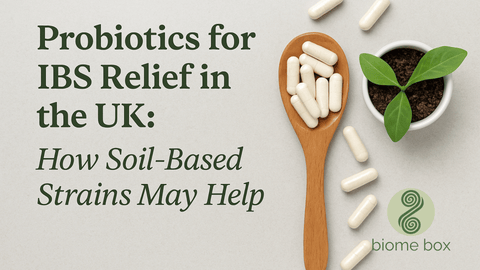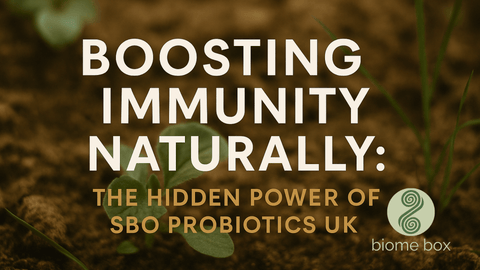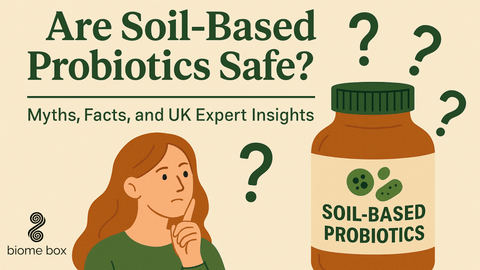Bacillus Coagulans vs Bacillus Subtilis: Which Probiotic Strain Is Best?

Bacillus Coagulans vs Bacillus Subtilis: Which Probiotic Strain Is Best for You?
The world of probiotics is vast — and not all strains are created equal. Among the most resilient and fascinating are soil-based probiotics such as Bacillus coagulans and Bacillus subtilis. Both belong to a group known as Soil-Based Organisms (SBOs) and are valued for their hardiness and potential to support digestive and immune balance.
In this article, we’ll explore the probiotic strains benefits of these two species, how they differ, and where they might fit within a balanced wellness routine — without overstating medical claims or replacing professional guidance.
Why Strain-Specific Probiotics Matter
When choosing a probiotic, strain specificity is key. Each species — and even each variant — may influence the microbiome differently. Some are more active in supporting gut comfort, others in promoting microbial diversity or immune regulation.
That’s why understanding the characteristics of Bacillus coagulans and Bacillus subtilis can help you choose the supplement that best aligns with your needs. You can find both in premium soil-based probiotic supplements UK.
Meet Bacillus Coagulans
Bacillus coagulans is a spore-forming probiotic known for its ability to survive the acidic journey through the stomach. Once in the intestines, it may help promote balance among beneficial microbes. Some studies suggest it supports digestive comfort and bowel regularity, particularly when combined with a healthy diet and lifestyle.
- Type: Lactic acid-producing, spore-forming bacterium.
- Main focus: May support digestion and gut comfort.
- Commonly found in: Capsules, powders, or liquid probiotics such as those by Microbz UK.
It’s often discussed in relation to probiotics for IBS relief, as it has been studied for its potential to assist people with digestive sensitivity.
Meet Bacillus Subtilis
Bacillus subtilis is another spore-forming bacterium commonly found in soil and plants. It’s known for its stability and for producing enzymes and compounds that may support microbial balance. This species is often associated with immune-support probiotics, due to its possible role in modulating immune function.
- Type: Aerobic, spore-forming bacterium.
- Main focus: May help support immune balance and gut lining integrity.
- Commonly found in: SBO probiotic formulations aimed at holistic gut health.
Some research also highlights its ability to produce essential nutrients like vitamin K₂, which plays a role in overall metabolic wellbeing.
Key Differences Between the Two Strains
| Feature | Bacillus coagulans | Bacillus subtilis |
|---|---|---|
| Primary Action | Supports digestive comfort and microbial balance. | Supports immune regulation and gut barrier function. |
| Spore Type | Endospore – acid-resistant. | Endospore – heat and oxygen-resistant. |
| Best Suited For | Individuals seeking general digestive support. | Those looking to maintain immune and gut health balance. |
| Typical Source | Soil-based supplements or fermented foods. | Soil-based formulations or plant-derived probiotics. |
How They Work Together
Many well-designed probiotic supplements combine both strains, as they can complement each other’s functions — one focusing on digestive comfort, the other on immune and gut barrier support. Together, they may help maintain microbial balance and overall gut integrity.
This synergy is part of what makes them popular in soil-based probiotic supplements formulated for everyday wellness.
Choosing a Reliable Source
When selecting a probiotic supplement, look for clear strain identification (e.g. Bacillus coagulans MTCC 5856), transparent labelling, and independent testing. UK retailers like Biome Box offer trusted brands such as Microbz, which specialise in liquid probiotics made with naturally fermented soil cultures.
Safety and Precautions
Both strains are generally recognised as safe for healthy adults, but people with underlying medical conditions should always consult a healthcare professional first. For more information, see our article Are Soil-Based Probiotics Safe? Myths, Facts, and UK Expert Insights.
Conclusion: Complementary Strains for Everyday Wellness
Probiotic strains benefits extend beyond digestion — they touch immunity, metabolism, and overall vitality. Both Bacillus coagulans and Bacillus subtilis have earned their place in the wellness toolkit for those seeking gentle, natural ways to support microbial balance.
Explore formulations featuring both strains in the Microbz collection at Biome Box, and continue your learning journey through our related guides on IBS support, immune health, and safety considerations.
This article is for educational purposes only and not intended to diagnose, treat, or replace professional medical advice. Consult your GP or healthcare professional before introducing new supplements.
Frequently Asked Questions
What’s the difference between Bacillus coagulans and Bacillus subtilis?
Bacillus coagulans primarily supports digestion, while Bacillus subtilis may help maintain immune balance and microbial diversity.
Can I take both strains together?
Yes. Many formulations include both to provide comprehensive gut and immune support.
Are these strains shelf-stable?
Yes — both are spore-forming bacteria, which means they remain stable at room temperature and survive stomach acid.
Are Bacillus probiotics safe for long-term use?
Current evidence suggests they are safe for long-term use by healthy adults when sourced from reputable UK or EU manufacturers.






